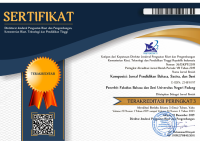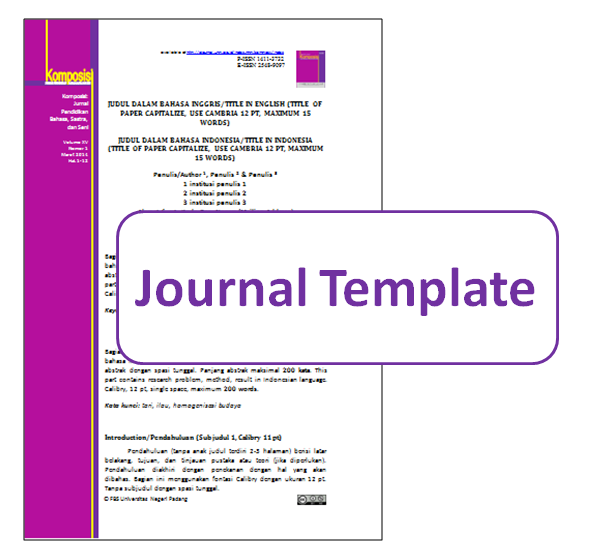IMPROVING STUDENTS’ READING COMPREHENSION OF DESCRIPTIVE TEXTS THROUGH COGNITIVE STRATEGY AT GRADE VII-2 OF SMPN 1 INDRA PRAJA TEMBILAHAN
Fauzul Etfita
Abstract
PERBAIKAN KEMAMPUAN SISWA DALAM MEMBACA TEKS DES K RIPTI F MELALUI STRATEG I K OGNITI F DI KELAS VII-2 DI SMPN 1 INDRA PRAJA TEMBILAHAN
Abstract
This study aimed at determining whether cognitive strategy can improve students' skills in writing descriptive texts, as well as the factors that influence the improvement of writing skills. This research is a classroom action research conducted in two cycles. Each cycle consists of four sessions. Each consists of a plan, action, observation, and reflection. Participants in this study were all students of grade VII-2 SMPN1 Indra Praja Tembilahan amounting to 22 students. The data were collected through: (1) observation sheets; students, teachers, teaching step (2) field notes (3) interviews, and (4) the writing test. The study found that the use of cognitive strategy can improve students' skills in writing descriptive text. The findings of this study indicate that an increase in the average value of students above the minimum completeness criteria namely 75 for English subject. The factors that influence students' skills in writing the descriptive text are (a) reading material provided to students, (b) students’ motivation, and (c) teachers’ approach toward the student. It can be concluded that the application of cognitive strategy on teaching reading descriptive text can give positive results with increasing students' skills in reading the descriptive text.
Abstrak
Penelitian ini bertujuan untuk mengetahui apakah cognitive strategy dapat meningkatkan keterampilan siswa dalam menulis teks descriptive , serta factor-faktor apa saja yang mempengaruhi peningkatan keterampilan menulis tersebut. Penelitian ini adalah penelitian tindakan kelas yang dilaksanakan dalam dua siklus. Setiap siklus terdiri dari empat kali pertemuan. Masing-masing terdiri dari plan, action, observation, dan reflection . Partisipan pada penelitian ini adalah seluruh siswa kelas VII-2 SMPN 1 Indra Praja Tembilahan yang berjumlah 22 siswa. Data penelitian ini dikumpulkan melalui: (1) lembar observasi; siswa, guru, langkah mengajar (2) catatan lapangan (3) wawancara, dan (4) tes menulis. Penelitian ini menemukan bahwa penggunaan cognitive strategy dapat meningkatkan keterampilan siswa dalam menulis teks descriptive . Temuan penelitian ini menunjukkan bahwa terjadi peningkatan nilai rata-rata siswa diatas kriteria ketuntasan minimal mata pelajaran bahasa inggris yaitu 75. Adapun faktor-faktor yang mempengaruhi keterampilan siswa dalam menulis teks descriptive adalah (a) bahan bacaan yang diberikan kepada siswa, (b) motivasi siswa, dan (c) pendekatan guru terhadap siswa. Maka dapat disimpulkan bahwa penerapan cognitive strategy pada pengajaran membaca teks descriptive dapat memberikan hasil yang positif dengan meningkatnya keterampilan siswa dalam membaca teks descriptive .
Keywords: Students’ reading Comprehension of Descriptive text, cognitive strategy
Keywords
Students’ reading Comprehension of Descriptive text, cognitive strategy
References
Burnes and Page, G. (1991). Insight Strategies for Teaching Reading. New York: Harcourt Brace Jovanich Group. Pty Limited.
Cavanagh, Jane (1998). Text Types. English K-6 Syllabuss. Retrieved at February, 18th 2013 from http://goldfieldsliteracy.wikispaces.com/file/view/Yvonne++Text+ Types+_A_+-+PDF.pdf
Civelek and Ozek (2006). A Study on the Use of Cognitive Reading Strategies by ELT Students. The Asian EFL Journal, Professional Teachers Articles. Retrieved at march, 18th 2013 from http://www.asian.efl.jpurnal.com/PTA.August. 06.Ozec&Civalek.pdf
Gerot, L. and Wignell,P. (1994). Making Sense of Functiona; Grammar. Australia: Gerd Stabler.
Hopkins, D. (1985). A teacher’s guide to classroom research. Philadelphia: Open University Press.
Kemmis, Stephen and Mc Taggart Robin. (1988). The Action Research Planner. Victoria: Deakin University.
Khezrlou,S. (2012). Cognitive Strategy Training: Improving Reading Comprehension in the Language Classroom. The Journal of Teaching Language Skills. Retrieved at march, 18th 2013 from http://www.teaching.language.skill.journal/ JTL53721319920200.pdf
Mukarto, dkk. (2007). English on Sky 1 for Junior High School Students Year VII. Jakarta: Erlangga.
Rosenshine, B and Meister, C. (1992). The Use of Scaffolds for Teaching Higher Level Cognitive Strategies. Retrieved at november, 12th 2013 from http:// www.ascd.org/ASCD/pdf/journals/ed_lead/el_199204_rosenshine.pdf
Sahan, Ahmet. (2012). Cognitive Reading Comprehension Strategies Employed by ELT Students. Retrieved at november, 12th 2013 from
http://sbe.erciyes.edu.tr/dergi/sayi_33/1.pdf
Syatriana, Eny. (2011). Developing the Students’ Reading Comprehension through Cognitive Reading Strategies of the First Year Students of SMAN 16 Makassar. Retrieved at november, 12th 2013 from http://www.niu.edu/international/ _images/Eny%20Syatriana.pdf
DOI:
https://doi.org/10.24036/komposisi.v15i2.7382
Refbacks
There are currently no refbacks.
Copyright (c) 2017 Komposisi: Jurnal Pendidikan Bahasa, Sastra, dan Seni
This work is licensed under a
Creative Commons Attribution-NonCommercial 4.0 International License .
Komposisi: Jurnal Pendidikan Bahasa, Sastra, dan Seni , a peer-reviewed online journal in languages, literature, and arts education.
Printed ISSN 1411-3732 , Online ISSN 2548-9097 .
Currently, Komposisi: Jurnal Pendidikan Bahasa, Sastra, dan Seni is indexed by: View My Stats
Visitors since February 2017:
Statcounter <div class="statcounter"><a title="web analytics" href="http://statcounter.com/" target="_blank"><img class="statcounter" src="//c.statcounter.com/11239717/0/d5796c6b/0/" alt="web analytics"></a></div> View My Stats
Published by:
Universitas Negeri Padang (UNP) Address: Faculty of Languages and Arts (FBS) Universitas Negeri Padang. Jl Prof. Dr. Hamka Air Tawar Barat, Padang - West Sumatera -Indonesia Telp/Fax. +62751 7053363 Home page: http://ejournal.unp.ac.id/index.php/komposisi | e-mail:komposisi.fbsunp @ fbs.unp.ac.id | cc: havid_a @ fbs.unp.ac.id
Server Luar
slot88
King Wood Car Care slot gacor
scam
situs toto
bandar togel
bandar togel
Slot Gacor Hari ini
situs toto
situs toto
toto togel
togel online
topup murah
harapan777
AMDBET
toto togel
slot88
login bayar4d
macau303
slot resmi apk slot online Slot Maxwin
situs toto
sakti55
situs toto felix168
nextogel
NEXTOGEL
NEXTOGEL
NEXTOGEL
NEXTOGEL
NEXTOGEL
NEXTOGEL
NEXTOGEL
NEXTOGEL
NEXTOGEL
NEXTOGEL
NEXTOGEL
NEXTOGEL
NEXTOGEL
NEXTOGEL
NEXTOGEL
NEXTOGEL
NEXTOGEL
NEXTOGEL
NEXTOGEL
NEXTOGEL
NEXTOGEL
NEXTOGEL
NEXTOGEL
NEXTOGEL
NEXTOGEL
NEXTOGEL
NEXTOGEL
NEXTOGEL
NEXTOGEL
NEXTOGEL
NEXTOGEL
JEPETOGEL
JEPETOGEL
JEPETOGEL
JEPETOGEL
KIM369
KIM369
KIM369
KIM369
KIM369
KIM369
KIM369
KIM369
KIM369
KIM369
situs toto toto slot kuntogel
situs toto toto slot sendok88
togel online toto slot https://www.eaglehighplantations.id/
toto macau
slot gacor slot gacor
batak5d toto slot Slot88 www.onscripture.com
slot online
situs toto
situs gacor bandar togel resmi toto togel https://montreallawfirm.com
wild west gold sering pecah
Toto 4D
slot88
toto macau
Situs Toto
Situs Toto
https://mercubuana.org/
Toto 4d
toto 4d
Toto 4D
toto 4d
info rtp akurat malam ini
Wanita Subang Beli mobil dari Nolimit city
rahasia Cuan Aztech Gems
Gatot kaca Buat TKW Jadi jutawan
Rahasia sukses bermain Mahjing wins
harapan princess starlight
Harapan sweet bonanza
taktik gates of olympus xmas
dukungan gates olympus
rahasia sukses bermain mahjong ways
Situs togel
slot gacor 2025
luxury89
Sulebet
sulebet
oja89
basic4d
situs toto togel online
vipbet888
momo128 login
https://garudafood.org/
jpmania mesin128
mesin128
mesin128
oja89
slot gacor
jumat4d slot login
https://pintu-pro.id/
slot gacor
Buat yang suka cari link slot gacor hoki69 maxwin tiap hari, ini tempat yang paling sering gue datengin.
choicehomecontractors.com
sarangslot
slot 4d gacor hari ini
Toto 4D
https://up2m.pkr.ac.id/jepangbet/
slot
simpatitogel
slot gacor hari ini
slot gacor
slot
https://unesa.id/












